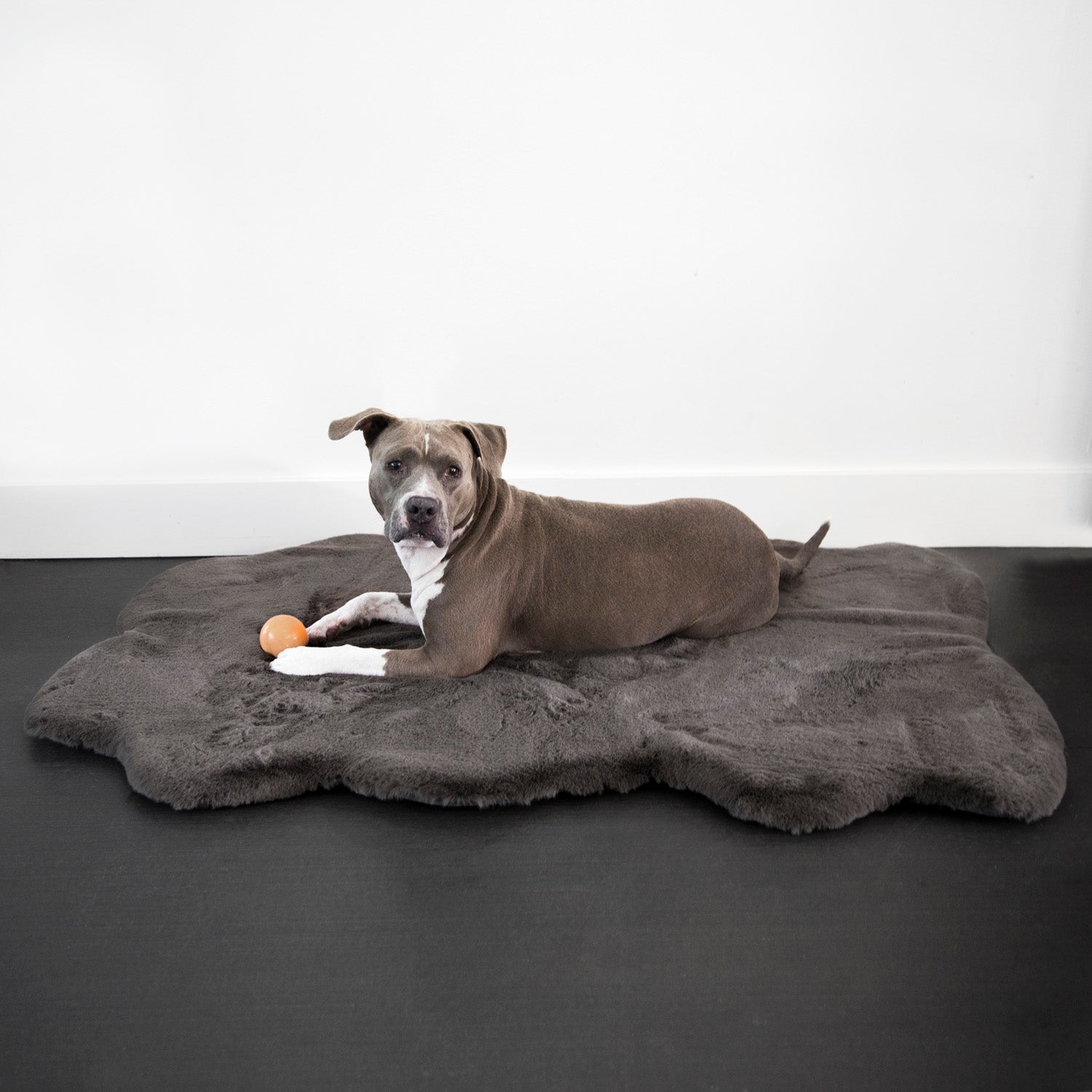7 Easy Ways to Make Your Senior Dog Feel Like a Puppy Again

As your pup ages, their physical capability may decrease. However, that doesn't mean that they can't continue to enjoy a high quality of life! By providing your dog with the right items, materials, and solutions, you can help your dog continue to exercise and enjoy life despite their physical limitations. Do you want to help your senior dog feel like a puppy again? Try some of these great strategies.
1. Use dog stairs to help them get up on high furniture
As a puppy, your dog was able to bound straight from the floor to your bed or couch. As they age, however, those simple tasks may become much more difficult. Jumping up and down can be very hard on the joints--or your pup might lose the strength to make the leap, especially if you have a small dog or furniture that sits high off the ground.
Dog stairs and ramps can make jumping up on the furniture easier for your pup, easing pressure on aging joints and decreasing the odds that they'll suffer an injury in a fall. Consider installing dog stairs near the furniture your pup uses most often so that your home will become pup accessible again.
2. Using an orthopedic dog bed that will help support their frame
During their puppy years, it may have seemed as though your furry companion could fall asleep anywhere. As your pup ages, however, they may need more support for their aging joints. Orthopedic dog beds help relieve pressure on the joints and keep your dog more comfortable. Not only does that mean less pain when they're lying down, that support can help increase flexibility and improve mobility once your pup gets up, making them feel younger and making it easier for them to exercise and play--which, in turn, will help keep them active longer.
3. Feeding them a healthy, nutrient-rich diet
As your dog gets older, ensuring that they get the right nutrition becomes more essential than ever. Senior dogs may need a senior-specific formula that is designed to be lower calorie, which may help prevent obesity as your pet gets older. In addition, many senior dogs may have specific health concerns that can impact their diet, including heart disease (which may require lower-sodium formulas) or liver or kidney disease, which may require a specific diet.
Talk to your vet about the best nutrition for your senior dog. You may need to change your formula based on the changing needs of your aging pet. In addition, be prepared to continue to adapt your pet's diet as needed. Keep in mind, however, that you may need to make changes gradually in order to avoid digestive upset.
4. Keeping up with regular dental cleaning
Regular dental cleanings can help avoid plaque buildup and gum disease in your pet just like they can for you. Not only can plaque create bad breath and cause tooth decay, it can help prevent dental pain and even prevent organ damage. The bacteria that causes the formation of plaque can enter your dog's bloodstream, where it can cause damage to the heart, liver, and kidneys. As a result, your senior dog can become very sick very quickly. Keeping up with regular dental cleanings, on the other hand, can help protect your dog from potential danger.
Look for a tooth-cleaning solution that is as comfortable for you and your dog as possible. Choose toothpaste specifically intended for dogs, since human toothpaste may contain compounds that dogs should spit out. If necessary, you may want to schedule regular tooth cleaning with your vet.
5. Providing a supervised exercise space for your dog
Senior dogs need the same opportunity to run and play that younger dogs do. However, they may become tired more quickly. Make sure your senior dog has plenty of room to run and play in a supervised, safe environment. That may include things like:
- Removing any dangerous objects, like glass, wire, or sharp objects, that could increase the risk of injury.
- Making sure that there are no hazardous chemicals stored in your backyard where the dog could get to them.
- Watching out for bugs and other hazards that could make your pet sick.
Make sure you have a secure fence around your dog's outdoor space so that he can't get out. A senior dog may have a hard time getting home again if he ends up a long way from home. In addition, make sure your dog has access to food, water, shade, and shelter so they can remain comfortable.
6. Offering regular baths and grooms
Regular baths and grooming can help keep your pet's coat soft and fluffy and may help protect the skin from potential irritations. In addition, you may want to have your dog trimmed before the hot summer months, since a senior pet may have a harder time maintaining their temperature and staying cool as the heat rises. Make sure you use high-quality grooming supplies that won't irritate your senior pet's skin.
7. Loving them!
Your senior pet needs your love and affection every bit as much as they did when they were a puppy, and spending quality time with them should be even more essential. Make sure you're still making time to love your pet and spend time with them. Get out in the yard and play, go for walks together, or cuddle up on the couch on a regular basis. If you want a strategy that will make your senior pet feel like a puppy again, one of the best strategies you can use is simply spending quality time loving on them.
Your senior dog is a member of the family, and you want to make their golden years as pleasant and comfortable as possible. Luxury pet products can help make your pet's life easier, reducing pressure on aging joints and providing help and support as your pet ages. Want to learn more about how you can brighten these senior years? Contact us today for more information about our luxury pet products.
Subscribe
Sign up to get the latest on sales, new releases and more…
Categories
- Dog UTI Symptoms: How to Spot, Treat, and Prevent Urinary Tract Infections
- Psyllium Husk for Dogs: Science-Based Benefits, Dosage and Use
- Dog Meal Prepping : A Complete Guide to Healthy, Time-Saving Homemade Meals
- Best Places to Take Your Dog on Vacation this 2026(USA Edition)
- Tails of Celebration: Working Dogs of the Lares Trek, A Silent Partnership In Peru
- 5 Easy Organic Christmas Recipes for Dogs: Simple Holiday Treats Your Companion Will Love
- The 6 Best Luxury Gifts for Your Dog This Christmas: Thoughtful Holiday Comfort That Truly Lasts
- Why Playtime Matters: The Benefits of Mental Stimulation and Playtime with Your Companion
- Tails of Celebration: The Miao Dog-Carrying Festival - A Hero's Honor in China
- A Dog-Friendly Thanksgiving 2025: Comfort, Calm, and Easy Treat Recipes
- The Best Dog Beds for Winter 2025: 5 Luxury Styles for Warmth, Comfort & Orthopedic Support
- Tails of Celebration: The Feast of Saint Hubert — Belgium's Timeless Blessing
- Halloween Safety Tips for Dogs: How to Keep Your Companion Safe This Spooky season
- Tails of Celebration: Día de los Muertos / Day of the Dead for Pets, A Festival of Memory in Mexico
- How to Care for Senior Dogs in Fall: Mobility Tips & Joint Support
- Tails of Celebration: Kukur Tihar & The Tihar Festival of Nepal
- What is a VDI Testing for dogs ? : Insights, Procedures and Preventive Measures
- Cheap Dog Beds vs. Luxury Dog Beds: The Real Cost of a $50 "Disposable" Dog Bed
- Can Dogs Have OCD? Understanding Canine Compulsive Behaviors (CCD)
- Does My Dog Like Music? Find Out What Tunes Make Your Pup Wag!
- Effective Solutions for Food Aggression in Dogs
- 7 Frozen Treats Your Dog Will Love This Summer☀️🧊🍉
- The Best Waterproof Liners for Dog Beds: Protect Against Spills, Drool, and Accidents
- How to Cope with the Loss of a Dog: A Tribute to Every Companion We Carry in Our Hearts
- Top Tips on How to Prevent Matting in Dogs
- Understanding and Managing Dogs with Hip Dysplasia
- The Ultimate Guide to Dog Gut Health: Natural Remedies, Probiotic Insights and Signs of Poor Gut Health
- The Best Supplements for Dogs: Explore Top Picks for Canine Health and Wellness
- How Often Should I Brush My Dog's Teeth? Tips for Optimal Canine Dental Health
- Ultimate Guide on How to Comfort Your Dog During Fireworks this 4th of July
- Managing a Blowing Coat: Essential Grooming Tips for Double-Coated Dogs.
- 5 Daily Habits That Boost Your Dog’s Long-Term Wellness
- Mastering Crate Training a Dog: Tips and Benefits
- Dog Car Seats vs. Seat Covers: What’s The Best Option For Your Companion?
- Best Outdoor Dog Beds: Luxury, Durability, and Unmatched Comfort
- Is My Dog Overweight? Tips to Assess and Help Your Companion
- The Best Faux Fur Dog Beds for Ultimate Pet Comfort of 2025
- Dog Running Guide: How to Start, Train & Stay Safe when running with your Dog
- Indestructible Dog Beds? The Truth Behind the Term
- Top Tips for Effective Exercise for Dogs
- Effective Dog Ear Cleaning: A Step-by-Step Guide for Maintaining Healthy Ears
- How to Manage Dog Aggressive Behaviors: Expert Tips and Advice
- Effective Canine Ear Infection Remedies: Symptoms, Causes & Treatments
- How to Make a New Dog Comfortable in Their New Home - 2025 Guide
- Signs of Dog Allergy Symptoms and How to Help and Prevent Them
- Why Does My Dog Lick Their Paws? Causes and Solutions Explained
- Dog Alzheimer's: Symptoms, Causes, and Treatment Options
- The Legacy of Comfort with the Iconic Animals Matter® Ortho Companion-Pedic® Puff Luxury Dog Bed
- Orthopedic Square Dog Beds: The Ultimate Blend of Luxury, Comfort, and Support
- Loungers: The Ultimate Beds for Luxury, Comfort, and Orthopedic Support


Leave a comment
Please note, comments must be approved before they are published